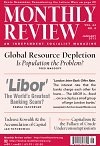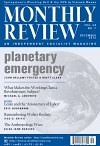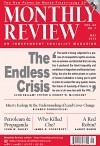Ecology

As Fred Magdoff notes in his article in this issue, the Royal Society of London—one of the world’s oldest (founded in 1660) and most respected scientific bodies—declared in its 2012 report, People and the Planet, that the environmental threat to the planet as a place of human habitation is now so serious that it is necessary for humanity to “develop socio-economic systems and institutions that are not dependent on continued material consumption growth.” In other words, a radical break with capitalism’s laws of motion is called for.… Behind this startling conclusion on the part of the Royal Society lies a nascent revolt of climate scientists against the dominance of capitalist economics in determining climate-change policy. | more…
Is Population the Problem?
Within the current system, there are steps that can and should be taken to lessen the environmental problems associated with the limits of growth: the depletion of resource taps and the overflowing of waste sinks, both of which threaten the future of humanity.… [H]owever, …attempts to trace these problems, and particularly the problem of depletion natural resources, to population growth are generally misdirected. The economic causes of depletion are the issues that must be vigorously addressed (though population growth remains a secondary factor). The starting point for any meaningful attempt actually to solve these problems must begin with the mode of production and its unending quest for ever-higher amounts of capital accumulation regardless of social and environmental costs—with the negative results that a portion of society becomes fabulously rich while others remain poor and the environment is degraded at a planetary level. | more…

As we write these notes at the beginning of November climate change is once again in the headlines in the United States and around the world. This is because of the devastating impact of Hurricane Sandy, not only on islands in the Caribbean, but also on the northeastern United States and particularly New York and New Jersey, with the impact of the storm dramatized by the damage to New York City. Coincidentally almost twenty-five years ago it was a heat wave experienced in New York, coinciding with climatologist James Hansen’s famous testimony to Congress, that first made global warming a public issue, and increasingly an international one with the formation that year of the United Nations Intergovernmental Panel on Climate Change. Whether Hurricane Sandy’s destruction in New York and New Jersey will lead to a similar elevation of climate change as a public issue this time around remains to be seen. | more…
Capitalism today is caught in a seemingly endless crisis, with economic stagnation and upheaval circling the globe. But while the world has been fixated on the economic problem, global environmental conditions have been rapidly worsening, confronting humanity with its ultimate crisis: one of long-term survival. The common source of both of these crises resides in the process of capital accumulation. Likewise the common solution is to be sought in a “revolutionary reconstitution of society at large,” going beyond the regime of capital.… It is still possible for humanity to avert what economist Robert Heilbroner once called “ecological Armageddon.” The means for the creation of a just and sustainable world currently exist, and are to be found lying hidden in the growing gap between what could be achieved with the resources already available to us, and what the prevailing social order allows us to accomplish. It is this latent potential for a quite different human metabolism with nature that offers the master-key to a workable ecological exit strategy. | more…
Beyond the Capitalist Alienation of Nature
When I consider the concept of harmony in the context of humans, their societies, and the environment I have a particular understanding of the concept. It refers to all people living together peacefully without exploitation of one person by another, each able to reach his or her full human potential, in a society in which everyone has their basic material and nonmaterial needs satisfied, feels secure, safe, happy, and fulfilled as human beings. In addition, the concept also implies harmony between people, the environment, and the other species we share the planet with.… [But] there is an overriding issue when considering harmony as I have briefly described it. Harmony in the world—among its people and between humans and the rest of the ecosystems—is not possible in the context of capitalism. Capitalism…has shown that it fosters interpersonal relations and metabolic interactions with the earth that are detrimental to achieving a harmonious existence. | more…
In 2003 Ted Nordhaus and Michael Shellenberger, two prominent environmental lobbyists, founded the Breakthrough Institute, a think tank dedicated to modernizing what they call “liberal-progressive- green politics.” Its focus is on winning support from mainstream businesses, politicians, and consumers with an attractive message: by developing the right technologies and policy tools, tackling climate change and increasing wealth can go hand-in-hand…. In practice, the approach they have adopted to boost the influence of their message…is to characterize all opinion within the environmental movement that is redder or greener than theirs as marginal, unrealistic, immature, or elitist…. Their position is essentially the same as that of the New Democrat and New Labour camps regarding the environment; and their tactics of triangulation are precisely those pursued by the New Democrats and New Labour since the early 1990s. | more…
Greenpeace International Meets the Movement for Justice in Bhopal
While the recent growth in transnational campaigns and coalitions has been welcomed by many, critics have questioned whether they reproduce existing global inequalities in power and resources. This article, which details a struggle for hegemony in a transnational anti-corporate alliance between a core country non-governmental organization (Greenpeace International) and a peripheral country social movement (the movement for justice in Bhopal), shows that the power in such alliances does not only reside with the core country organization. | more…

University of Nevada, Las Vegas physicist John W. Farley’s very important review essay on James Lawrence Powell’s new book, The Inquisition of Climate Science, in this month’s issue of MR raises critical questions with respect to science, corporate propaganda, and the future of humanity.… To understand the serious propaganda challenge that has confronted capitalist interests intent on denying climate change and the devious means used to get around this, one needs to recognize that the scientific consensus on climate change is an extremely strong one. Science, which generally encourages controversy, is in this case speaking with one voice. Naomi Oreskes, a professor of history and science studies at the University of California, San Diego…published an article in Science in 2005 studying global climate change articles in peer-reviewed scientific journals between 1993 and 2003. She found a total of 928 peer-reviewed scientific articles on global climate change. Of these 928 pointed to human-caused climate change, while on the “other side” there were exactly zero denying this. | more…
The spread of humans worldwide, especially in the last two hundred years, has been associated with the growing human domination of the earth…. Such domination of the environment is expressed by… (1) the change in the flux of elements and substances on Earth…; (2) the growing threat of species extinction; and (3) the huge land cover change (LCC)—the substitution of natural habitats such as forests, swamps, and grasslands by cropland, pasture, roads, and urban areas. Modern natural sciences have made enormous inroads in understanding both ecological problems and the social drivers of LCC. However, they have been unable to generate a systematic understanding of how the regime of capital has governed LCC. Karl Marx developed more than 150 years ago, in the context of a social-science critique, an unparalleled theoretical approach to environmental crisis based on two concepts: differential land rent and the metabolic rift. Here, these concepts will be applied to the understanding of LCC. | more…
The Anatomy of the Global Warming Denial Industry
James Powell was inspired to write this important new book because of a remarkable paradox: among climate scientists, there is a near-unanimous consensus that global warming is occurring now, is largely manmade, and will cause very severe environmental problems if humanity continues business as usual. However, among the lay public the picture is much more mixed: only about half of the U.S. public agrees with the climate scientists. Why the enormous discrepancy?… The Inquisition of Climate Science explains in detail how the global-warming-denialist ideas that serve the interests of the oil companies (and fossil-fuels industry) become sincerely held beliefs for a significant fraction of society. | more…
The last four or five decades have seen extraordinary economic and population growth in the southern states of the United States, continuing historic developments that started during the Second World War and were later stimulated by the end of legal racial segregation. One national effect of those changes has been a continual shift in the center of economic growth for the whole country to the southern and western states, away from the Northeast and the Midwest “rust belt.” The character of the exploitation of labor in the South has changed as investment patterns have displaced large populations from manufacturing and extractive employment.… This new “New South” has been widely celebrated, even as regional wage rates still trail other sections of the country (and while the South shares the national upward redistribution of wealth). What is different now from the pattern in the 1950s is that realizing a return on investment by the sweating-it-out of workers is nothing like the obvious low-cost option it was then. | more…
The governments of almost all developing countries are facing the long-term twin problems of capital shortages and high fiscal debts, resulting from their attempts to modernize the state forms and economic and financial relations left by colonialism or copied from western political culture. Whether they claimed to be of the left or the right ideologically, they almost invariably undertook policies to attract foreign investment and encourage domestic private investors to join the global industrialization competition during the twentieth century…. Continental China, the biggest developing country, with the largest population (but also with significant natural resource constraints) has close to 20 percent of the world’s population, but only 9 percent of its arable land and a mere 6 percent of its fresh water. Over the centuries, China had its share of drought- or flood-induced famines. But if not for a 6,000-year history of irrigated agriculture, with its related “village rationality” based on traditional indigenous knowledge—which internalizes risks by its multifunctional rural cultures of sustainable self-reliance—China would have been a land of perpetual hunger. | more…


